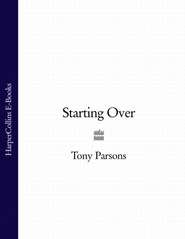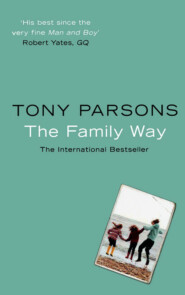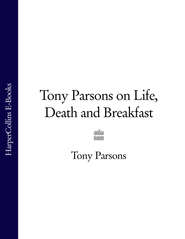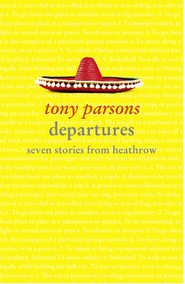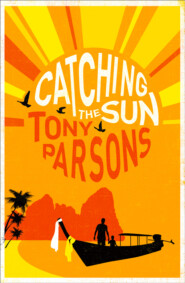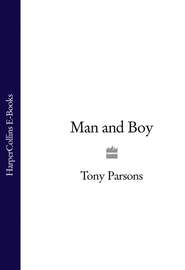По всем вопросам обращайтесь на: info@litportal.ru
(©) 2003-2024.
✖
Stories We Could Tell
Автор
Год написания книги
2018
Настройки чтения
Размер шрифта
Высота строк
Поля
A cloud seemed to pass across his father’s face. ‘What about the kids? The little half-castes? Did you ever think about them? Not belonging to any group. How do you think that feels?’
‘If we all got mixed up together then there wouldn’t be any more racism,’ Ray said. ‘Because then we would all be the same. Got any more blackcurrant, Mum?’
It was one of the things he argued about with his father. Along with the volume and value of his music, the length of his hair and John Lennon. It felt like they argued about everything these days. Ray wished he knew a black woman just so he could marry her and show his father that all men were brothers.
‘Birds of a feather,’ Ray’s father said, pointing his knife at Ray. ‘You don’t see robins flying about with crows, do you?’
‘Are you a crow, Dad? Are you a robin?’
‘She’s nice,’ his mum said. ‘Miss Korea. What one do you like, Robbie?’
‘I don’t like any of them!’ Robbie said, blushing furiously. Ray laughed. He knew that his brother liked all of them. He wasn’t fussy He had heard Robbie fiddling about in his stripy pyjamas when he thought that Ray was sleeping.
‘Enoch’s right,’ his father said. ‘Send them all back.’
‘What if they come from here?’ Ray said, pushing the last of his bread and jam into his mouth. ‘Where you going to send them back to, Dad?’
With his father still ranting about birds of a feather and beasts in the wild, Ray got up and carried his plate out to the kitchen and went upstairs to his bedroom. He knew what he needed, and put on the Who as loud as he dared – 5.15, sad and angry all at once, to match the way he felt.
Why should I care? Why should I care?
As he made sure that he had enough tube fare to get him back to the city, Ray remembered something he had heard at The Paper. Skip Jones had told him that taking heroin was like stepping into a golden bubble – your troubles melted away when you were in there. That was how Ray felt about his music. It made the world go away.
But from downstairs came the rank stench of home-made beer – bitter hops, liquid malt extract and priming syrup, the whole sorry mess fermenting in the huge metal vats for weeks at a time – and it almost made him gag. That was the problem with living at home with his parents.
Ray’s floor would always be his father’s ceiling.
Leon stood at the hermetically sealed windows of The Paper, watching the sun going down and the crowds leaving the tower block, scuttling to Waterloo station and home.
When he was certain that most of them had gone, he went to the washroom and stared into the mirror above the sink. He waited for a few moments, heard a cleaner clatter by, and then slowly removed his hat.
Leon’s hair was thick and wiry, like something you would use for scrubbing pans, but what was most striking about it was that a few hours earlier it had been dyed a virulent orange. Autumn Gold, it had said on the packet.
Leon winced as if he had been slapped. He quickly replaced his hat, gripped the brim with both hands and firmly pulled it down over his ears. It was a disaster. As always.
Leon hated his hair. And Leon’s hair hated him right back.
There was a line from a Rod Stewart song, back when Leon was fifteen years old and Rod was still big mates with John Peel and playing the working-class hero – kicking footballs around on Top of the Pops, pretending he was fresh off the terraces, before he developed that embarrassing taste for straw boaters and blazers and high-maintenance blondes and Art Deco lamps, and everyone had to pretend that they had never liked him in the first place.
It was the first line of the first track on Every Picture Tells A Story – the line that rhymed ‘mirror’ and ‘inferior’. Leon always felt like that song had been written about him.
He knew there were battles to fight now. The middle ground was collapsing, and the Fascists were getting stronger. Not the public-bar bigots, the Alf Garnetts ranting on the sofa, but real Jew-baiting, Paki-bashing Fascists. Out there right now, getting bolder by the day, their numbers swelling, the hate spreading like a virus. Leon had seen their faces at Lewisham, clocked their proud Nazi salutes, and glimpsed what was inside them. There was nothing remotely funny about them, these dreamers of repatriation, these would-be builders of new ovens. Something had to be done.
So why the fuck, Leon asked himself, was he still worried about his hair? You didn’t need a good haircut at the barricades.
He slung his record bag over his shoulder. Inside it was the latest edition of his fanzine, Red Mist. Too valuable to leave lying around the office, Leon believed. Someone might steal it.
The fanzine – a Xeroxed mix of radical politics, new music and cut-up kidnapper’s graphics, hastily stapled together – had landed Leon his job on The Paper eighteen months ago, reminding some of the older guys of their radical youth. But there were sighs and rolling eyes when Leon tried to sell Red Mist in the office, and when he said they should have more politics and less showbiz.
‘We’re a music paper, man,’ they told him every day, as if the music could ever be separated from what was going on in the street, as if music wasn’t a part of the real world but just some playpen that they climbed into for light entertainment.
Leon believed that the new music could be a force for social change. The fire still burned. The audience just needed to be radicalised. And the musicians just needed to be educated. Basically all you needed to change was everything.
Most of the new groups just didn’t get it. They dreamed of the same old stuff – sexual opportunities, uncut white drugs and driving a Rolls-Royce into a swimming pool. They thought that anti-Nazism was just a cool brand name to be dropped in interviews, just another pose to be struck, as empty as Mick Jagger marching to Grosvenor Square to stop the Vietnam War in the Sixties.
But Leon knew this was real. The Labour Government wasn’t going to last for ever. Jim Callaghan wasn’t going to be around for much longer. And then what would happen? Fighting in the streets, Leon reckoned. Struggle. Civil unrest. More riots. Read your history books, he thought. Ask A. J. P. Taylor. See what happens when the centre is too weak to hold. A Lewisham every day of the year.
And when it was all over, from the ashes would rise a better world where racism was defeated and Leon’s hair did exactly what it was told to do.
Chapter Three (#ulink_6db03dea-0b87-5800-b265-3676f85abd3a)
‘I tell you, Dag Wood is hung like Red Rum,’ Terry said. ‘When he gets it out, it’s like – I don’t know – an Indian snake charmer…or a sailor with a rope…he sort of has to unfurl it.’
This was one of the best parts of the job, Terry thought. Coming home and telling your mates what had happened, all the interesting stuff that you weren’t allowed to put in a magazine that they sold in sweet shops. He loved it. He looked over at Misty sitting on his desk and she smiled encouragement. He knew how to tell a story.
‘Now are you sure it was Red Rum?’ Leon said, slightly bashful in the presence of Misty. He had only recently learned how to be around her without blushing. He was sitting on his desk, knees drawn up to his chin, smiling as Terry paced their little office, holding his hands out like a fisherman measuring the one that got away. ‘Are you sure it wasn’t Arkle he was hung like?’
‘What’s Red Rum?’ Ray said, swinging back and forth in his chair, fiddling with his tape recorder, his hair falling in his face.
‘Famous racehorse,’ Leon said. ‘Won the Grand National lots of times. Despite being built like Dag Wood.’
‘Definitely Red Rum,’ Terry said. ‘I got a good look. We were standing at these traffic lights, right? Just me and Dag, in the middle of the night. And he’s asking me about the scene in London how good the bands really are, what the audience are going to make of him – and this VW Beetle pulls up at a red light, and Dag whips it out – unfurls himself – and then…takes a leak on the Beetle with this enormous thing.’ Terry shook his head. He still couldn’t believe it. The outrageous act had been done so casually, so naturally, that he still couldn’t work out if Dag had done it to shock him, or if he was truly that untamed. ‘I’ll never forget the look on that Beetle driver’s face.’
Misty slid off Terry’s desk and half-raised a hand in salute, leaving their office with a wry smile and a raised eyebrow, like a wife of twenty-five years who enjoyed the story, but who had heard it before: Dag taking cocaine until his ears bled, Dag reducing a woman reporter from Fleet Street to tears, Dag banging groupies two at a time after his girlfriend had left town.
There were things about Dag that had made Terry uncomfortable – the cruelty, the casual, almost gluttonous infidelity, the choice of drugs – everybody in London under the age of twenty-five believed that cocaine was the chemical equivalent of a feather cut. But Dag had been like every rock star that Terry had ever met – a great seducer.
Dag had gone out of his way to make Terry love him – giving him a book of Van Gogh’s letters to his brother Theo that Dag had been given by David Bowie – there was a neatly written inscription at the front – borrowing some instruments in a West Berlin jazz bar so that Dag and his band could play a few of their greatest hits, showing him his extraordinary cock – and so Terry did.
In fact, Terry loved Dag so very much that there was one thing he had left out of both his piece and the other story he told his friends. Dag looked old.
Really old. Horribly old. If you could imagine Rip Van Winkle as a porn star, then you were getting the general idea about Dag Wood and the way he looked.
Terry had been so eager to hero worship Dag, so desperate to lionise this man that all the new bands name-checked as a major influence, so hungry to be his best friend that he hadn’t had the heart to say how prehistoric Dag looked.
Dag’s body – which he showed off at every possible opportunity, habitually tearing off his shirt not just on stage but during interviews and at sound checks and at the hotel’s buffet breakfast – was still in great shape, lean and pumped, like one of those Charles Atlas ads at the back of DC and Marvel comics.
But the ravages of ten thousand nights of debauchery and depravity were in every deeply ploughed line of Dag’s face, like Dorian Gray in silver lamé trousers with his hair dyed white. Dag Wood looked like a recently deceased bodybuilder. But Terry kept that to himself. Because it didn’t fit his story.
The three of them looked up as the editor of The Paper appeared in their doorway. Kevin White was twenty-nine years old, and every inch a grown-up version of the Mod he had once been. The only man in the office who came to work in a suit. White was tall, powerfully built, with curtain-parting hair, like one of the Small Faces around the time of ‘Lazy Sunday’.
‘Can I see you in my office, Ray?’
Ray shoved his tape recorder in his desk and followed White to his office. Leon pulled a copy of Red Mist out of his shoulder bag and began thumbing through it. Terry sat at his desk, closed his eyes and sighed with contentment.
It was good, yes, telling his friends was good. Almost the best part.
But when Terry introduced Dag Wood to Misty later at the Western World, and they both saw just how much the other one loved him, then it would be perfect.






